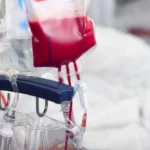What is sleep apnea?
Contents
Sleep apnea is a sleep disorder, in which your breathing stops and restarts many times while you sleep a common sleep condition.
It occurs in about 25% of men and nearly about 10% of women, however, it can affect all ages, including children to older people (1).
There are 2 types of sleep apnea include – obstructive sleep apnea and central sleep apnea.
Obstructive sleep apnea – In this upper airway becomes blocked which completely or reduces airflow to the lungs, this is common SA.
Central sleep apnea – It happens when the brain does not send a signal which is needed to breathe.
Normally, air flows smoothly from the mouth and nose into the lungs at all times, including during sleep.
But during this condition, breathing stops completely, which leads to poor sleep, due to waking several times, also called apnea or apneic episodes.
Check Out – Breathing Exercises To Increase Lung Capacity – At Home
Reasons & Risk factor
Sleep apnea is caused by many reasons, whereas central and obstructive sleep apnea has different-different reasons including:
- Obesity (is the most common reason for SA)
- endocrine conditions (which are related to our body glands)
- medical conditions include – asthma, COPD, pulmonary fibrosis,
- Structural issues
- neuromuscular conditions where brain signal interferes with the breathing signal.
- pregnancy
- A low-oxygen environment like mountain peaks can cause sleep apnea, after a few weeks.
NOTE: It is also common in heart patients and forms of heart, kidney, and lung disease.
In children, the most common reason for OSA is enlarged tonsils or adenoids, In adults obesity, male sex, and older adults above 50.
Check Out – Common Things That Can Be Reasons For Night Sleeplessness
Risk factors
However, age, family history, lifestyle habits, and other medical conditions can raise your risk of sleep apnea.
Age – As we get older, fat tissue builds up in the neck and tongue and changes in the brain wave may raise your risk of sleep apnea (6).
Health issues – There are some health conditions that may be the reason for both OSA and CSA including:
- Heart and kidney failure can cause fluid to build up in your neck, which blocks your upper airway.
- large tonsils and a thick neck
- amyotrophic lateral sclerosis (is a nervous system disease that affects nerve cells in the brain and spinal cord)
- myasthenia gravis (weakness and rapid fatigue of muscles)
Change in hormone levels – It can also affect SA, eg: people who have low or high levels of thyroid hormone have a high risk of SA.
Family history and genetics – It also plays a vital role, where in affecting shape, size, and upper airway and can raise the risk of sleep apnea (9)
Lifestyle habits – drinking alcohol, and smoking (which causes inflammation in the upper airway) increase the risk of sleep apnea.
Gender – Men are more prone to SA than women, and younger men are also at a high risk of sleep apnea than same-age women (5)
Opioid use – Researchers show that it has been allied with the development of central sleep apnea.
Premature birth – Children born preterm before 37 weeks of pregnancy were significantly more likely to be diagnosed with sleep apnea (5)
NOTE: Sleep apnea leads to high blood pressure, heart disease, attack, glaucoma, diabetes, behavior problem, and even cancer.
Symptoms
There are many signs and symptoms of sleep apnea that sleep partners easily see including:
- Loud or disturb snoring
- breathing that starts and stops during sleep
- gasping for air during sleep
- excessive daytime sleep
Daytime sleepiness is significantly allied with mental illness, accident cases, cardiovascular morbidity, and mortality (13) (14) (15).
People who have SA may experience these symptoms due to Sleep apnea including:
- Morning headache
- daytime sleep can lead to learning, focusing, and reacting to problems.
- oblivion
- drowsiness
- frequent waking during sleep due to stopping oxygen supply to lungs
Other symptoms may (12) include:
Children who have sleep apnea may experience these:
- Bedwetting
- worsening asthma
- irritable due to lack of sleep at night
- trouble in paying attention in school
Sleep apnea symptoms in women which may differ from men include:
- mental woes such as anxiety, depression, and headache in the morning
- insomnia
- tiredness (8)
- daytime sleepiness
- walking up often during sleep
How doctor diagnose it?
Your health care provider may ask, or perform some test on you that clear have sleep apnea or not, including:
- The doctor may ask you or your partner about your – symptoms, family history, and risk factors.
- sleep study – In this sleep specialist checks your sleep pattern during sleep.
- A sleep schedule, where you keep track – how long and how well you sleep, and how sleepy you feel during the day.
The doctor may perform some tests on you which may become the reasons for sleep apnea (6) including:
- Blood tests
- thyroid hormone test
- total testosterone and dehydroepiandrosterone sulfate (DHEAS) tests, which can help find out with polycystic ovary syndrome.
- EEG (wires are attached to your scalp that will monitor brain waves)
- EOM (recording eye movement)
Your doctor may ask you about your medication (if you are in medication periods) because certain medications may affect your SA.
Treatment
Its treatment is very important and left treatment makes the symptoms severe.
If the disorder progresses, the sleepiness becomes dangerous, which may lead to mental, major work-related issues, and road accidents (5) (6).
Here is some popular treatment for sleep apnea include:
CPAP
Studies tell that continuous positive airway pressure (CPAP) is still considered the gold standard treatment.
CPAP is a machine that provides constant air pressure in your throat to keep the airway open when you breathe in.
However, CPAP may have some side effects on health including:
- Congestion
- dry eyes
- dry mouth
- nosebleeds
- runny nose
A meta-analysis study examining crashes of drivers, resulting shown that CPAP significantly reduces the risk after treatment.
Some studies have shown that CPAP treatment rapidly improves insulin sensitivity, while others don’t support (7) (8),
Oral device
It is a device that a patient orally wears on their mouth while sleeping (7), and there are 2 types of oral devices include:
Mandibular repositioning mouthpieces (covers the upper and lower teeth and holds the jaw in a position that prevents it from blocking the upper airway)
Tongue retaining device (hold the tongue in a forward position to prevent it from blocking the upper airways)
Facial massage therapy
This therapy improves the position of your tongue and strengthens the muscles that control your tongue, upper airways, and face.
Exercise of face muscles also called orofacial therapy, which can treat sleep apnea in children and adults (9)
Check Out – Facial Acupuncture: How Does It Work? Benefits, Adverse Effects
Surgery
In this removing upper airway obstruction widens the airways by detection of the site where the obstruction occurs.
Surgery may have some risks which include:
- Anesthesia medications
- chance of excessive bleeding
- breathing problem
- forming a blood clot in a deep vein
- urinary retention
- infection
- allergic reaction
Healthy lifestyle
The person can manage it by adopting or changing some healthy lifestyles including:
- lose overweight
- avoid smoking and excessive alcohol
- do daily exercise, like yoga, breathing exercises, running, etc
BOTTOM LINE
It is a most common sleep-related disorder, in which breathing stops and restarts many times while you sleep.
When we sleep, our tongue, throat, and jaw all relax, this can narrow the throat airway.
And when we breathe in all the soft tissue around the throat vibrates, causing that snoring sound.


